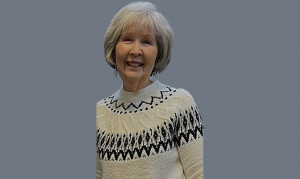It is of paramount importance that I teach my husband how to be a Southerner, at least a half-decent one if not one of regal bearing.
For instance, I tell this dear man, who descended from those who traveled on the Mayflower, and therefore is generations deep in New England, that to be a true Southerner, you have to get into everyone else’s business. Not in a mean way but in a caring-I-can-help kind of way.
His family has boundaries. No one over shares or over asks. No one intrudes or inquires with personal questions. Everyone minds their own business. Drives me crazy.
Now, my family? Well, no one ever heard of boundaries. We’re appalled at such a thought. If one of us has a problem, we’ve all got a problem. And if one of us doesn’t think we have a problem, the rest of us will be happy to point out why she does have a problem and then offer wise counsel on how to resolve it. Our motto is: You got a problem. We got a solution.
We don’t timidly put a toe into someone’s business. We dive in, fully clothed and immerse ourselves in the situation. We pull together, we grumble together, we debate and, importantly, at least to us — we pray for each other.
Secondly, to be a proper know-it-all Southerner, you have to know people’s names, who they’re kin to and the history of the family. Tink is failing miserably at this.
Now, I know he’s new at this but you’ve got to start with the last name. When we started to consider building a new barn, Tink plunged into the task with his typically inquisitive nature. He bought books, studied plans, asked for advice from farmers and visited barns. One day, he returned from a barn field trip.
“What was the guy’s last name?” I asked.
“Don’t know.” He knows I hate that answer so he thought for a moment, in order to give me more information. “The folks who own the farm came down to say ‘hello’.”
“Really? What were their names?”
A sheepish look crossed his face. I rolled my eyes. “Listen, you need to learn that here in the South, we know people, we know who they’re kin to and we have all the background information. You have to know enough that you can keep going until the person you’re talking to knows who you’re talking about.”
It’s so simple: if you know enough about the person, you will eventually find a connection between him and the person you’re talking to. The next day, Rodney, my brother-in-law, stopped by the house. He started a story but needed to set the characters before launching into the tale.
“Do you know Walter Moses?” he asked me. I shook my head.
“He worked for Ben Gooch for years. Used to be his right-hand man.”
“No,” I replied. “I don’t know him.”
“He went to White County to high school. I think he graduated but something makes me think he mighta quit before he finished. Nice looking man. Dark headed. He comes to church sometimes and sits back there on the last bench. Next to the Roberts. Always smilin’. I know you’d know him if you saw him.”
“Hmmm. I can’t place him.”
“His brother, Sam, owned that store over off 115 for ‘bout 35 or 40 years. I don’t know for a fact but I’m sure there’s a big age difference between ‘em because Sam would be in his late seventies now — he’s still alive — and Walter is mid-fifties.”
I got it. I don’t know Sam but I’ve known Sam’s funny, personable wife for years. I had the connection. I knew the family and, therefore, I knew Walter. Sorta.
That’s how it’s done in the South, though.
It’s six degrees of separation. Southern Style.
[Ronda Rich is the best-selling author of “There’s A Better Day A-Comin’.” Visit www.rondarich.com to sign up for her newsletter.]












Leave a Comment
You must be logged in to post a comment.